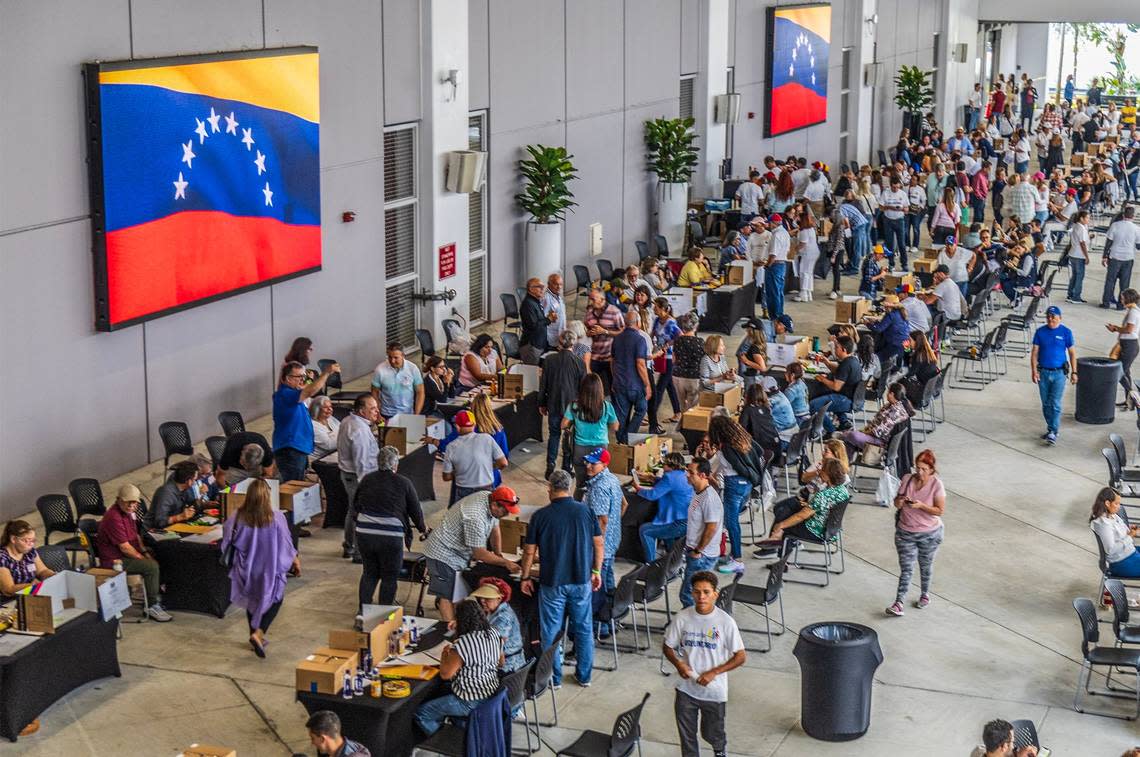‘Disastrous’: Venezuelans in South Florida react to Biden admin release of Maduro ally

- Oops!Something went wrong.Please try again later.
- Oops!Something went wrong.Please try again later.
- Oops!Something went wrong.Please try again later.
Members of South Florida’s Venezuelan community criticized the Biden administration following the release of a close confidante of Venezuela leader Nicolás Maduro from federal custody in a prisoner swap that is bringing several American citizens back home.
Alex Saab, a Colombian businessman and Maduro ally awaiting trial in a high-profile, money laundering case in Miami, was exchanged for 10 American citizens and a Malaysian fugitive, the Biden administration confirmed Wednesday. Maduro’s government also liberated 21 Venezuelan prisoners, including one of the main campaign organizers for Maria Corina Machado, who won the opposition’s presidential primary in Venezuela in late October.
But the release of Saab as part of the Washington-Caracas deal has stunned Venezuelan exiles and ignited uproar among members of South Florida’s congressional delegation, who say that the prisoner swap could embolden the Maduro government, as well as other world leaders with hostile relationships with the U.S.
“Are they going to release El Chapo tomorrow too?” said Ernesto Ackerman, president of the Miami-based Independent Venezuelan-American Citizens, referring to the former Mexican drug lord who ran the Sinaloa Cartel and who was sentenced to life in U.S. prison in 2019.
Ackerman told the Miami Herald in an interview that the release of Saab weakened U.S. national security because it would encourage criminals to act against American interests knowing there was a chance they could be freed.
“The weakness that the Biden administration is showing the whole world is very dangerous,” said Ackerman.
The Venezuelan advocate also participated in a press conference called by Republicans in Doral on Wednesday condemning the release of the Colombian businessman. Rep. Carlos Gimenez, Colombian community leader Fabio Andrade, and proxies for Reps. Mario Diaz-Balart and María Elvira Salazar and Senator Rick Scott, also participated.
Gimenez told reporters that he was “extremely disappointed with the actions of the Biden administration” and said that while Wednesday’s swap was good news for the prisoners and their families, it would put more Americans around the world at risk.
“If you are a regime and you simply want one of your criminals back, all you need to do is kidnap some Americans anywhere in the world, and this administration is going to be negotiating with you,” said Gimenez. “This is a continuation of a pattern by this administration to negotiate with terrorists.
After the press conference, Salazar put out a statement on her X account, describing Saab’s release as a “a new victory for the Maduro regime.”
Saab was detained in June 2020 in Cape Verde and later extradited to the United States. U.S. prosecutors allege that he and another Colombian national funneled $350 million dollars into overseas accounts by taking advantage of a contract to build low-income housing for the Venezuelan government. The federal government also accused him of bribing Venezuelan officials to look the other way. He faced up to 20 years in prison.
Saab, who has also served as a Drug Enforcement Agency informant, was awaiting trial in prison. He was viewed as a treasure trove of information on the inner workings of the Venezuelan government.
READ MORE: Alex Saab, the key man in U.S.-Venezuela prisoner swap, made millions from Maduro regime
José Antonio Colina, a former Venezuelan National Guard lieutenant who leads an organization of politically persecuted Venezuelans in South Florida, told the Herald that he respected the federal government’s right to broker deals that benefited national interests, but called the development “disastrous.” He referred to the release of two of Maduro’s nephews who had been convicted of drug smuggling in exchange for other American prisoners in October 2022 as another example of Biden administration’s concessions to the Venezuelan government.
“It seems like there is an understanding between the United States and Nicolás Maduro’s regime, which is perilous. It generates great concern for us. We worry that if they could hand over an individual like this one, they might hand over Venezuelan political exiles on American soil,” Colina said.
William Díaz, the founder of Casa de Venezuela, an Orlando-based organization that has supported Venezuelans in Central Forida and across the U.S. for two decades, told the Miami Herald that as a Venezuelan he was unhappy about Saab’s freedom, but that as an American, he was happy that the U.S. prisoners were coming home.
Díaz, whose group also works in immigration advocacy, said that despite Wednesday’s news, his fellow countrymen should remember that the Biden administration had created historic benefits for them, such as the designation of Temporary Protected Status for the country in March 2021 and the expansion of the program for an additional 472,000 Venezuelans this September.
“In every international conflict, there is an exchange of prisoners. Let us remember that there were some prisoners in Russia, in the former Soviet Union, in Iran, who were released through exchanges. We Venezuelans are not accustomed to international conflicts, so it surprises us and makes us think that it is a weak administration,” said Díaz.

